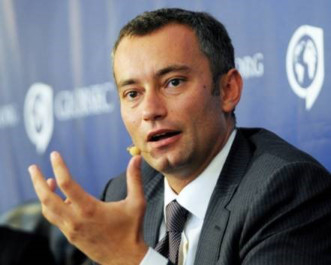
Occupied Jerusalem: Nickolay Mladenov speaks over a patchy phone line on his way to the airport, once again.
“Everybody, literally everybody, needs to step back from the brink,” urged the UN special coordinator for the peace process, before his trip last week to the United Arab Emirates to meet its foreign minister.
In recent months, Mladenov has become the point man for efforts to reverse the rising risk of war between Israel and Hamas and to kick-start Gaza’s economy, shuttling among Israelis, Palestinians, Egyptians and potential donors in the Gulf.
His flurry of Middle East diplomacy comes at a time when Israeli-Palestinian violence is spiking, living conditions in the Gaza Strip are rapidly deteriorating - and the Trump administration’s effort to play the traditional US role of peace broker is flailing.
Mladenov, a Bulgarian diplomat, played a key role in brokering a partial cease-fire last weekend as violence flared, with Israel and Hamas engaging in the most intense round of daytime fighting since the 2014 Gaza war.
His efforts come at a time where the United States has undermined its ability to promote even a Gaza-focused initiative by actions that Palestinians consider punitive, including recognising Occupied Jerusalem as Israel’s capital and cutting aid for the Palestinians.
In January, the United States slashed its funding to the United Nations Works and Relief Agency (UNWRA) by $300 million.
More than two-thirds of Gaza’s 2 million residents rely on aid from the agency.
“Everything the US touches, it makes it a very hard sell,” said Ofer Zalzberg, an analyst at International Crisis Group, who said that the US has embarked on a path of “coercive diplomacy” with the Palestinians that has not paid off.
Palestinian leaders last month slammed press reports that the US was arranging an economic initiative for Gaza.
The Palestinian Authority accused the White House of trying to divide Palestinians, by focusing on Gaza in isolation from the Israeli-occupied West Bank, and reducing the political conflict between Israelis and Palestinians to a purely humanitarian one.
“The Americans have cut aid for UNWRA, so how dare they speak about the humanitarian situation in Gaza,” said Saeb Erekat, the Palestinian Authority’s chief negotiator.
“The Americans have disqualified themselves from any kind of role.”
Mladenov’s efforts include securing funding for a range of infrastructure in Gaza, including water and power projects.
He declined to detail the level of funding secured for these projects but said all sides have agreed on them.
Although a range of ideas has been floated, from building an industrial zone in Egypt’s Sinai to an airport or sea port in Cyprus, he said his focus is on projects that can be developed immediately.
When asked about the US role, Mladenov said he is working with “all potential donors but our key partners are the Palestinian Authority, Israel and Egypt. There is only one plan for Gaza, and that’s our plan right now,” he said.











